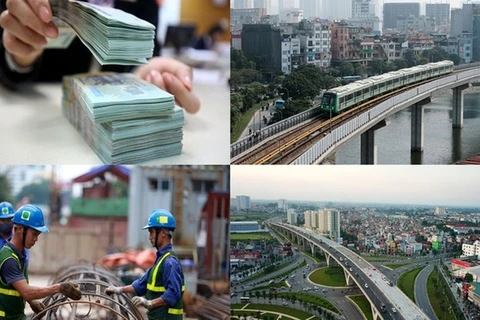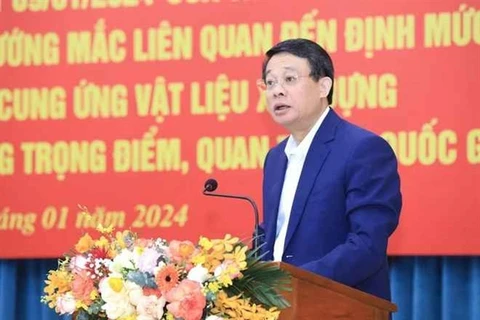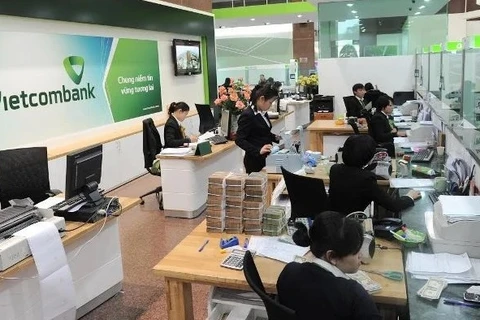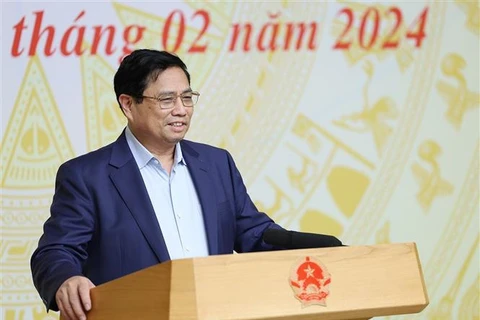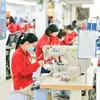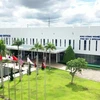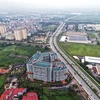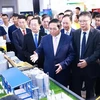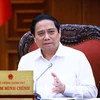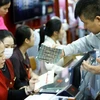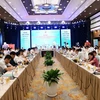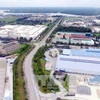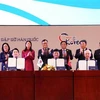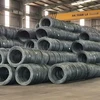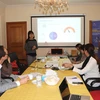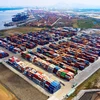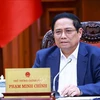Hanoi (VNA) – Overcoming headwinds, Vietnam has shown strong performance in maintaining macro-economic stability and securing economic development. This year, the National Assembly has set a target of 6-6.5% in GDP growth.
In an interview granted to VietnamPlus, Minister of Planning and Investment Nguyen Chi Dung highlighted prioritised measures to achieve the goals.
Reporter: The year 2024 is predicted to see intertwined challenges and opportunities. Could you please give more detail?
Minister Nguyen Chi Dung: Talking about advantages, the scale and potential of the economy have continuously expanded through nearly 40 years of “Doi Moi” (Renewal). Our country has accumulated a lot of experience in managing and responding to fluctuations in the world and regional situation, especially during the COVID-19 pandemic.
Vietnam has received recognition and praise from international organisations, global credit rating organisations and large-scale enterprises. This is an important foundation for our country to continue to respond and adapt effectively to new difficulties and challenges, especially unexpected problems that arise.
The country’s fundamental elements of institutions, infrastructure, human resources, science and technology, and innovation continue to be enhanced. This is especially the case after the National Assembly passed the Land Law (revised), the Law on Credit Institutions (revised) in its early 2024 session, gradually meeting the requirements of national development and emerging situations.
To date, the country has completed and put into use about 1,900 km of highways, of which, the length in 2023 alone was 475 km of highways as well as coastal and inter-regional roads. This contributes to opening up new development space for regions, localities and the country.
In addition, the basic planning work has been completed, thereby determining the direction of development and attracting investment in priority industries, thus effectively promoting the potential and advantages of particular regions and localities. On the other hand, the National Innovation Centre was also inaugurated, which is an important driving force to promote innovation, form a national innovation ecosystem and the country's creative startups in the future.
Foreign relations and high-level diplomatic activities as well as economic diplomacy have been outstanding highlights with important and historically significant achievements.
Vietnam welcomed US President Joe Biden, and General Secretary of the Communist Party of China and Chinese President Xi Jinping. The country elevated relations with the US to a comprehensive strategic partnership for peace, cooperation and development. Relations with Japan have also been elevated to a comprehensive strategic partnership. This opens up new opportunities and advantages in development cooperation in many economic fields and new industries such as chips, semiconductors, culture, science and technology, innovation, and high quality human resources training.
However, we need to look at the great difficulties and challenges. In 2024, it is forecast that there are many potential risks from the world political-economic environment, posing negative impacts on Vietnam's economic recovery and growth prospects. Strategic competition among world powers is becoming fierce, while conflicts in Ukraine and the Gaza Strip are likely to persist, increasing geopolitical and geo-economic fragmentation. The Asia-Indo-Pacific region, including Southeast Asia, is likely to continue to be the driving force for global growth, but still has many potential uncertainties, unpredictable "hot spots", posing threats to peace and stability of the region.
This leads to a downturn in global economic growth, trade, and investment. Inflation and monetary policies of major economies still contain elements of uncertainty. Meanwhile, countries are accelerating the implementation of "legalisation" of new standards and criteria on international trade and investment, creating pressure for enforcement globally, affecting the competitiveness of developing countries, including Vietnam, requiring adjustments and adaptations in both the short and long term.
Furthermore, traditional and non-traditional security issues, especially epidemics, natural disasters, climate change, water security, food security, and energy security are predicted to grow more complicated with strong and multi-faceted impacts on stability and sustainability in the world, the region and our country. The negative trend in the regional and world situations will continue to affect business activities, industrial production, import and export, and investment attraction.
The structure of world demand is changing towards "green consumption," which creates significant challenges for Vietnamese products in meeting requirements on standards and origin and engaging more deeply in the new value chain.
In addition, the challenge to regional integration will remain complicated if specific measures are not soon identified and deployed to promote the advantages of each region, each industry and each locality. Production and business, the lives of a part of the people are still difficult. Business resilience is eroding, and the consequences and impacts of the COVID-19 pandemic continue to linger, compounded by new difficulties from the beginning of 2023 until now. Not to mention, natural disasters, droughts, storms and floods, and climate change can be more complicated, with increasingly strong impacts on economic and social activities like food production, water supply for electricity generation, production and husbandry. Issues related to cyber security, food security, energy security, epidemics are always permanent and unpredictable.
Reporter: Amid such difficulties in the world and domestic situation, what has the MPI proposed to the Government in order to enhance the resilience of the national economy?
Minister Nguyen Chi Dung: The situation requires Vietnam to make a timely and effective response, grasping opportunities to make breakthrough developments. These include promoting new driving forces in the green economy, green growth, digital economy and circular economy to enhance the internal strengths and the economy’s resilience. This will create impetus for fast and sustainable growth and successfully and comprehensively completing socio-economic targets for 2024 and the five-year plan.
We should focus on a number of key tasks and measures. Firstly, it is necessary to popularise and drastically implement policies, orientations and laws of the Party and State. This includes resolutions and conclusions of the Party Central Committee, Politburo and National Assembly regarding socio-economic development and the expansion of sectors, areas, regions and localities as well as the national master plan and other issued planning.
Secondly, it is crucial to keep a close eye on the situation, increase the quality of forecast activities and roll out management measures in a flexible, timely and effective manner to handle arising problems, ensuring the macro-economic stability, controlling inflation and ensuring major balances of the economy.
Thirdly, the country should continue to optimise opportunities from strategic partnerships and comprehensive strategic partnerships, especially with major economies to effectively mobilise domestic and foreign resources to strongly promote economic growth and innovation.
Fourthly, Vietnam should promote economic restructuring and growth model renovation, develop new industries of digital economy, green growth and circular economy such as chips and semiconductors, attracting green finance resources, preferential green credit, and building and developing regional and international financial centres in Vietnam.
Ministries, sectors and localities should continue to effectively implement three strategic breakthroughs, especially the breakthrough in infrastructure, with strategic, key, and dynamic infrastructure projects that contribute to inter-regional connection. Also, it is important to enhance internal capacity and economic autonomy, improve domestic production capacity, and strengthen connections between FDI enterprises and the domestic sector. It is important to diversify output markets and supplies of raw materials, mastering technologies and supply chains, ensuring supply-demand of essential goods, energy security, and domestic food security, harmoniously combining economic growth with cultural and social development and environmental protection, and firmly ensuring national defence and security and promoting foreign relations and economic diplomacy.
Reporter: Looking back over the past years, after overcoming the effects of the COVID-19 pandemic, the economy has continued to be "besieged" by difficulties from geopolitical conflicts among countries, high inflation as well as decline in global trade and demand. However, Vietnam's economy has still overcome "headwinds" to become a bright spot of economic growth in the region. How do you comment on this result?
Minister Nguyen Chi Dung: Since the beginning of 2023, amid the complicated and unpredictable fluctuations in the world and regional situation, our country's economy has steadily overcome headwinds, continuing to achieve many important and comprehensive results in all fields, and becoming a bright spot in the global picture.
The results were thanks to the engagement of the whole political system, the consensus and efforts of all people and enterprises under the leadership of the Party, the coordination of the National Assembly and other agencies in the political system, and the drastic and systematic direction and management of the Government and the Prime Minister. Also critical is the solidarity and close coordination of the administrations at all levels, all sectors and all localities. Vietnam has shown strong performance in adapting to new situation and context, and received high evaluation from international organisations and credit ranking organisations.
The outstanding thing is the drastic and timely implementation of the Party and State’s policies, orientations and laws, which has motivated the engagement of the whole political system and close coordination among the Party, National Assembly and Government agencies in institutionalising policies decided by the Party Central Committee, Secretariat and Politburo.
The strength of great national unity, the spirit of self-reliance the aspirations and efforts to rise up have been promoted. The Party and Government have firmly kept the practical situation under control and given proactive, prompt, timely, flexible and effective response, while being steadfast, brave, unwavering in the face of challenges and difficulties, and timely shifting focus in directing and managing socio-economic development, promoting growth associated with maintaining macro-economic stability.
Businesses and people have strived to respond and adapt to new contexts and situations in the world, region and country. Resources have been gradually unlocked, mobilised and used effectively, especially new growth drivers and models according to development trends. Disbursement of public investment capital has been promoted through regional coordination conferences, promoting regional linkages and the strengthened investment promotion activities.
This shows the proactive search and optimising of cooperation opportunities from the trend of shifting investment capital flows and supply chains in the region and globally to attract large-scale, modern projects in the manufacturing-processing industry and new industrial sectors and areas. In addition, policy institutions have been built and perfected to meet reality’s requirements. The direction and administration work has been conducted in a synchronous and flexible manner with the close coordination among policies, the clear identification of priorities, focuses and key points.
Decentralisation has been sped up in combination with the allocation of resources and enhancement of enforcement capacity. The reform of administrative procedures has been sped up, while efforts were made to solve legal problems facing businesses, investment projects, bidding, public investment, State budget, real estate markets, corporate bonds, along with the handling of stagnant businesses, projects, weak banks and "zero dong" banks.
In particular, State administrative discipline has continued to be tightened through the strengthening of inspection and supervision activities and the timely and accurate reward and discipline activities, as well as the resolute and persistent fight against corruption, negative phenomena and wastefulness. The implementation of socio-economic activities have been conducted towards taking the people as the centre, the subject, the most important resource, the driving force and the goal of development. In particular, the Government has always prioritised allocating resources for human, cultural, and social development and promoting policy communication, contributing to creating social consensus and strengthening trust among the people.
Thank you very much!

